How to Write a LitRPG
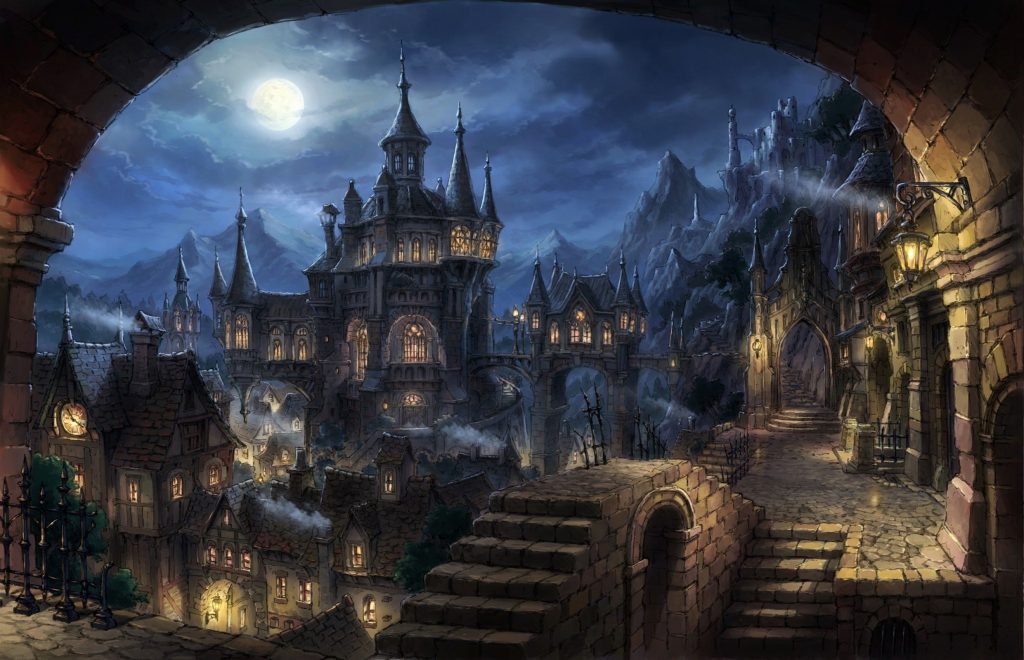
There’s a new subgenre budding in the science-fiction and fantasy space, aptly named LitRPG, short for Literary/Literature RPG. Although it is a relatively niche space, the subgenre has a strong, passionate following. LitRPG satisfies the exact fantasy of living inside a game or a similar game-like environment, working around world rules and systems.
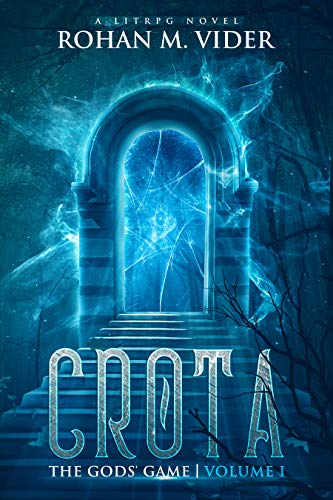
If you are part of the following, there’s no doubt that you might want to dip your toes into writing a LitRPG yourself. However, writing LitRPG is different from writing just any other story: the incorporation of gaming systems and writing aspects can be a challenge in and of itself. However, don’t worry as we’re here to help you out on this quest in writing a great LitRPG!
What a LitRPG Is
Due to the recency of the genre, the definition of a LitRPG novel is still pretty vague and debated until today. However, there are common elements that the community agrees should be present for a piece of work to be called LitRPG.
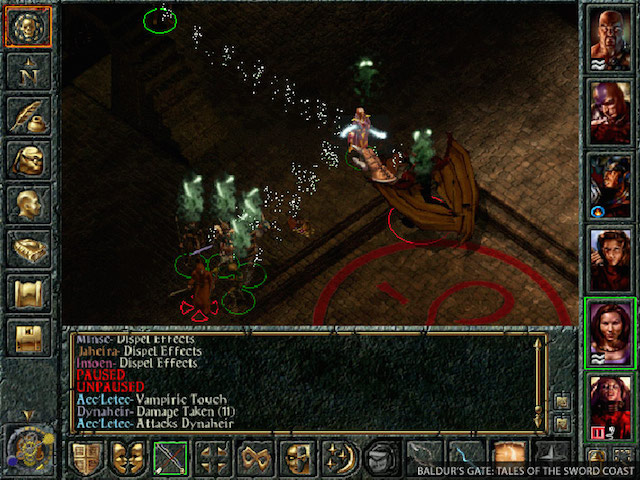
A LitRPG novel should have an explicit path of measurable power progression for the main character. This progression must be supported by the fictional world/game with absolute rules and systems, which are often designed similarly to game mechanics.
This trait often lends itself to the definition that a LitRPG tells the story of the main character playing a game, specifically role playing games. However, many people have considered that as long as the fictional world functions similar to a game despite not being one exactly, it can still be considered as a LitRPG.
Another element of LitRPGs is the fact that the main character is aware of coming from a separate plane of existence different from that of the fictional world. In most LitRPGs, this means that the main character, who is navigating a virtual avatar inside a fictional game, knows that they are playing a game. Occasionally, they might take a break from the game, although this might not be applicable for settings where the main character is catapulted into the game-like world (as in isekai), instead of experiencing a game.
Now that we recognize the common characteristics of a LitRPG novel, we can start talking about how to write a LitRPG that’s sure to be a banger!
Tips on How to Write a LitRPG
Avoid Information Dump
This is one of the most crucial aspects of a LitRPG: being able to showcase the gaming aspect as well as the storytelling part of the LitRPG. Much like writing fantasy novels, you should explore the game world and showcase its vastness to the reader. LitRPGs even exemplify this point further: since the genre solely exists because of its premise, you need to give even more attention to the gaming systems.
However, remember to not fall into the common errors of fantasy novels, like information dump. It is tempting to explain your world to the reader; after all, you painstakingly designed this game and its mechanics and you want everyone to understand it. Simply dumping all this information right into the reader’s face will make your piece akin to an instruction manual rather than an actual novel.
A good way to get around this is to sprinkle bits of important information about your world throughout your novel. Make sure this is within the context and beneficial to the plot and not just a random occurrence. Otherwise, the process will feel clumsy.
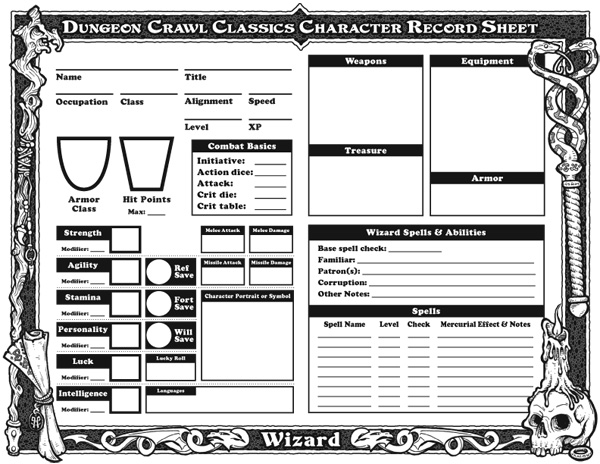
A highly debated area of interest regarding information dump deals about the gaming aspects, such as character sheets and battle information. The community is undecided whether littering the novel with a lot of the gaming flavor text is objectively better than conservatively, if not completely ignoring, placing these extra content. However, you can’t go wrong by striking a balance: to deal with excessive information, you can always opt to only reveal as much as the plot requires you to.
Unless you know what you are doing, you might not want to overdo the battle logs and stat sheets before your LitRPG becomes a pick-your-own-adventure kind of novel (which is entirely different, by the way, but that’s a topic for another day).
Develop a System that Makes Sense
LitRPGs are different from fantasy/science fiction stories in that they strictly adhere to an established system of mechanics and rules, specifically the power progression or “leveling” of a character. Much like any game, the system in a LitRPG must make sense, and its rules are consistently being followed throughout the story.
If your main character is supposedly overpowered, do not just give the “protagonist” and “plot armor” excuse. You need to explain why your main character is overpowered and how they gained their powers. Their strength needs to make sense in the world: did they grind for hours in the game to get this ultra-rare weapon, or were they privy to specific combos and tricks that allowed them to speed through the game?
The charm of LitRPGs lies upon the main character’s creative use of powers and skills in overcoming challenges that come their way, but that charm is completely nullified if your system is imperfect and botched with excuses of “exploits” and being the “Chosen One” nonsense.
In writing your story, give them enough information to understand the strategic choices made by the main character as well as the ramifications of that decision. Make the information reflect the plot. Include relevant information that builds the suspense, adds to the plot, and engages the readers.
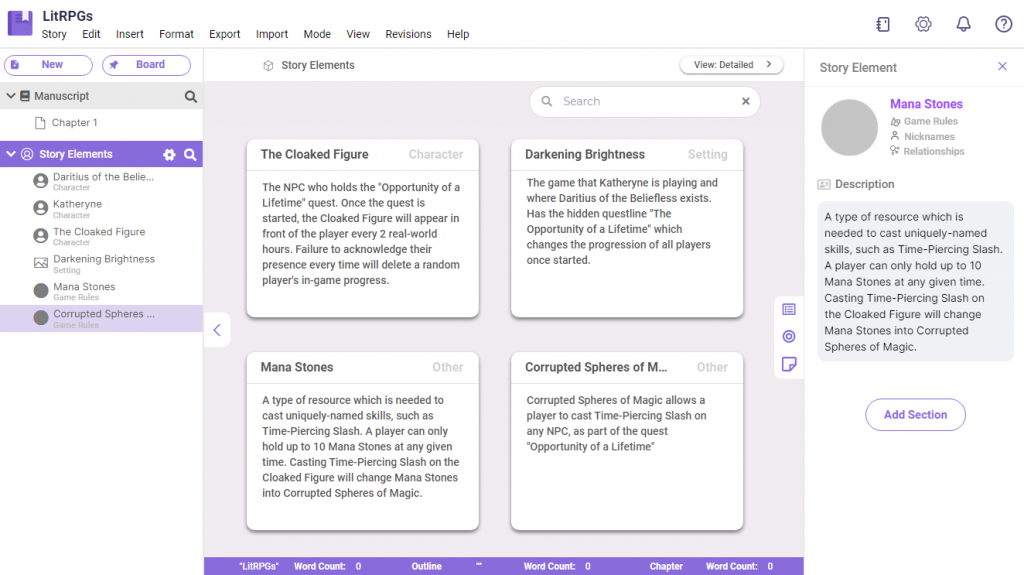
In making a world that makes sense, you are bound to set rules and describe those rules and their limitations. LivingWriter has the perfect space for you to write notes about them: Story Elements. With Story Elements, you can write notes about important aspects of your story, such as characters, places, and even systems and rules. You can even add images for visual inspiration.
One of Story Elements’ best features is the fact that it integrates very well with your manuscript. As you mention a Story Element in your manuscript, LivingWriter automatically identifies that Story Element and pulls up all your notes about it on the sidebar. Now, you have access to your notes and you don’t have to miss a detail at all!
Write Interesting Characters
LitRPGs are not simply aimless retellings of an RPG experience. They are still, at their core, a novel, and novels, for them to be compelling, need to have an equally compelling protagonist.
Give your main character an interesting personality, traits that make them human and relatable. Novels, LitRPG or not, thrive and crash down on how engaging their protagonists can be. Avoid falling into basic story tropes like Mary Sues and Gary Stus.

One way to make your protagonist interesting is to take advantage of the fact that your main character is aware of their circumstances as being separate from the world they were living on. Depending on your LitRPG’s premise, the protagonist’s actions may be inconsequential to their original lives and world, so play around the virtual freedom that your character has.
Your other characters should also become their own persons that are unique and different from each other. Make sure that your cast of characters are as interesting (or at least their interactions with your main character) and human as your protagonist.
The villain doesn’t even need to be a menacing beast “hell-bent” on destruction. They can be morally gray, where their backstory shows that they might be simply a product of their circumstances. Whatever the case is with your ‘bad guy,’ make sure you have made their motivations realistic.
Remember, you can write your characters first in Story Elements so that you can have an idea of how they might interact in your story!
Don’t Ignore the Plot
The gameplay aspect of a LitRPG novel is what sets it apart from other novels but ultimately it is a novel, which means you need to have a consistent plot all throughout. Tying up the loose ends at the end is a must. Don’t finish by leaving your readers with more unanswered questions.
Even if you plan on writing a LitRPG series, each novel should have their own individual plots, with separate yet interconnected resolutions. Sometimes, you might even want to backtrack a bit and realize that your story material does not need to span multiple novels.
Take special note of your characters and their motivations. Were the needs and wants your characters started with achieved? The characters which you have painstakingly developed need closure, as well.
Who’s the Storyteller?
When writing your novel, be clear about who is telling the story. Is it a first person narrative? Is the hero describing their thoughts and experiences? If this is the approach you have chosen when writing your litRPG then remember to stay in character. It’s very easy to slip back into your voice especially if the character has a personality very different from yours.
One limitation of using a first person voice is that you’re restricted to one point of view. If you try adding another character’s point of view, your readers will slowly disconnect from the main character.
Another option is to write in third person. This voice is a lot easier to work with, as you can describe scenes from various angles. However, even in this voice, there are issues you will need to work around. For example, using a third person voice lacks emotional involvement with the characters and can sometimes sound like monotone descriptions.
Both approaches have their advantages and disadvantages. There is no simple solution to using one voice. Choose a narrative voice that fits your LitRPG novel.
Explore LitRPGs with LivingWriter
LitRPGs can be tricky to write, what with having to juggle between the gaming aspects and the storytelling part of the genre. However, whichever background you may come from, whether you started off as a gamer or a writer, you can still definitely pull off writing a LitRPG novel.
Not confident or lacking inspiration? Then take a look at LivingWriter and its expansive tools and features and you might want to spend some time with it. The convenience and ease that LivingWriter provides to writers will make it so that writing any novel, LitRPG or not, will be as painless as possible.
Try LivingWriter now!